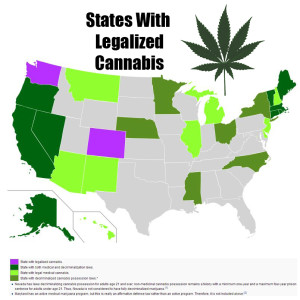 Even in the excitement of legal recreational marijuana sales rolling out in California on January 1s t, a very big problem remains: the lack of financial services. The ability for consumers to consume recreational cannabis in California is expected to bring in billions in tax revenue. Despite this massive revenue and the fact that medical marijuana has been legal for two decades, the industry is still unable to secure the financial services they to operate safely and efficiently.
Even in the excitement of legal recreational marijuana sales rolling out in California on January 1s t, a very big problem remains: the lack of financial services. The ability for consumers to consume recreational cannabis in California is expected to bring in billions in tax revenue. Despite this massive revenue and the fact that medical marijuana has been legal for two decades, the industry is still unable to secure the financial services they to operate safely and efficiently.
While business is booming – thanks to laws like Prop 64 – marijuana merchants are struggling behind the scenes. More and more people are showing up to make purchases, no longer afraid. But businesses themselves are finding it harder and harder to operate efficiently. Under federal law, cannabis is still classified as a Schedule I drug (alongside heroin and ecstasy). This status is holding these businesses back.
Even though there are federal compliance guidelines, marijuana’s federal status makes banks very wary. Unwilling to push themselves into a risky situation, they choose to stay away from the industry. Despite the industry’s booming growth.
After receiving rejection letter after rejection letter, merchants are forced to operate in cash. Without a merchant account from a bank, these businesses have no means of writing a check, doing a direct deposit or processing debt and credit card transactions. Paying bills requires only minutes of the typical business owner’s time. For the cannabis merchant, the process is not only long and overwhelming, it isE unsafe. From paying employees and bills to paying taxes, all transactions are done solely in cash.
The Internal Revenue Code Section 280E only complicates things further. This tax code was created with the intention of crippling illegal drug trafficking businesses. Since marijuana is still illegal on the federal level, this tax code affects the marijuana industry’s legal businesses.
420 College CEO, George Boyadjian, says, “It kind of cripples the business a lot. It prevents businesses from growing and reaching their full potential.”
After Prop 64 was passed, California state Treasurer John Chiang formed the Cannabis Banking Working Group. Since then, this group has been working hard on banking recommendations for the regulations scheduled to be released in 2018. The goal of this banking system is to get the most fiscally from the marijuana industry. Even so, the federal-state legality gap remains an issue, and will impact the effectiveness of this system.
“It’s not going to be a perfect pathway unless the federal government allows for this kind of activity and they take cannabis off Schedule I [status],” explains Chiang.
Many marijuana businesses continue to seek cash solutions and safe payment processing services through alternative lenders like Marijuana Merchant Account. Businesses can avoid operating in cash-only, and provide customers with multiple payment options. For merchants trying to safely and quickly pay bills, employees and taxes, this is great news. Rather than waiting for the federal government to reclassify marijuana (who knows when that might be), merchants can secure services now.



